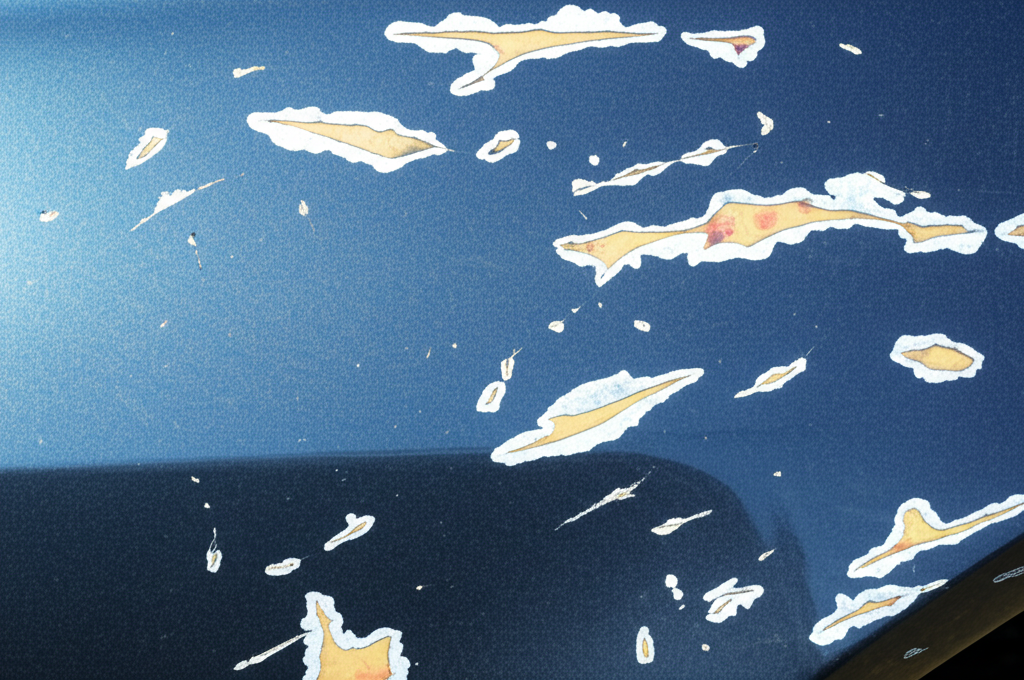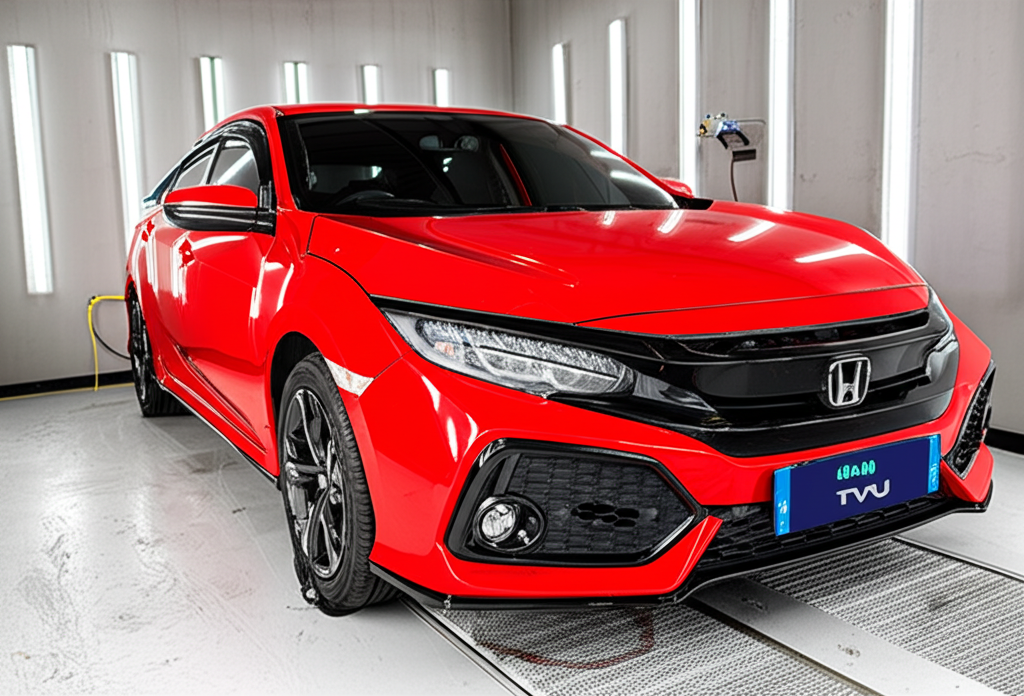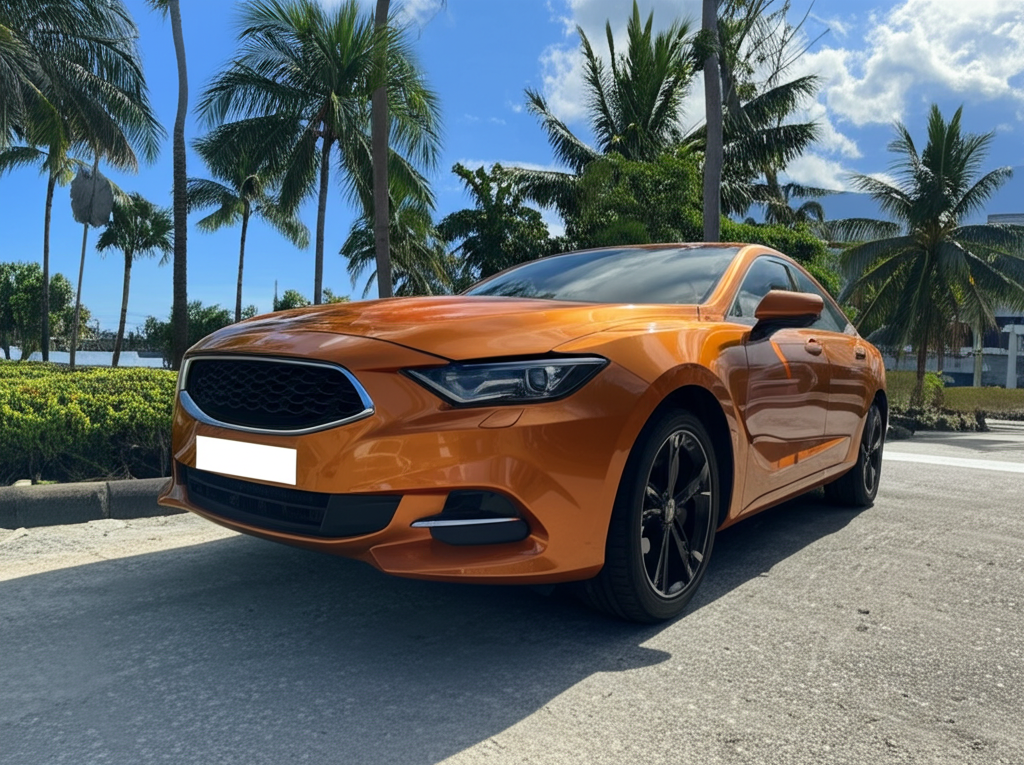Living in a tropical paradise like Thailand comes with countless perks: stunning beaches, vibrant culture, and delicious food. But the relentless, year-round sunshine, while glorious, poses a significant threat to one of your prized possessions – your car. Have you noticed the once vibrant color of your vehicle starting to look a little dull? Perhaps seeing worrying signs of oxidation, or even worse, the clear coat beginning to yellow and peel? You’re not alone. The intense Ultraviolet (UV) radiation in regions close to the equator accelerates the degradation of automotive paint, leaving it vulnerable and aged before its time. That brilliant shine you fell in love with can quickly become a faded memory under the harsh tropical sun.

The constant barrage of UV rays breaks down the chemical bonds in your car’s paint and clear coat. Pigments lose their vibrancy, leading to fading. The protective clear coat can become brittle, oxidize (appearing chalky or yellowed), and eventually fail, exposing the base color coat to further damage. This isn’t just an aesthetic issue; it significantly impacts your vehicle’s resale value and can lead to costly paint repairs down the line. So, the critical question arises: how can you effectively shield your car’s paintwork from this invisible assault and keep it looking showroom-fresh despite the intense tropical climate?
Case Study: Alex’s Rescue Mission for His Fading Honda in Bangkok
Meet Alex, an expatriate living in Bangkok who loves his sporty red Honda Civic. He meticulously maintained it, washing it regularly. However, after two years of navigating the city’s streets and parking under the unforgiving Thai sun, he noticed his car’s fiery red paint was losing its punch. It looked duller, almost pinkish in certain light, and he could see faint signs of oxidation starting on the roof and bonnet – the areas most exposed to direct sunlight. “I was really worried,” Alex recalls. “I invested a lot in this car, and seeing the colour fade felt like watching my investment diminish day by day. I considered repainting, but the cost and hassle were significant, and I knew the same problem would just happen again.”

Frustrated, Alex started researching paint protection solutions specifically designed to combat strong UV radiation. He learned about Paint Protection Film (PPF), particularly the advanced Thermoplastic Polyurethane (TPU) variants known for their durability and UV-blocking properties. After consulting with a reputable auto detailing and wrapping specialist in Bangkok, he opted for a high-quality, clear TPU film with enhanced UV inhibitors. The process involved a thorough decontamination wash and paint correction to remove the early signs of oxidation, followed by the precise application of the TPU film to the entire vehicle. “The change was immediate and dramatic,” Alex beams. “Not only did the film restore a deep gloss that made the red look even richer than before, but I gained incredible peace of mind. Now, I park outside without constantly worrying about sun damage. The film acts like a strong sunscreen for my car, plus it protects against minor scratches and road debris. It’s been over a year now, and the colour is still as vibrant as the day the film was applied.” Alex’s Honda is no longer a victim of the sun; it’s a testament to proactive protection.
Understanding TPU Film: Your Car’s Best Defence Against Tropical UV
Why is TPU film so effective, especially in high-sunlight environments? It boils down to its material composition and advanced features. Unlike older PVC (Polyvinyl Chloride) films, which can yellow and become brittle relatively quickly under intense UV exposure, modern TPU films are engineered for resilience and longevity.
Key advantages of TPU PPF for tropical climates:
- Superior UV Resistance: High-quality TPU films incorporate potent UV inhibitors within their layers. These inhibitors absorb or block a significant percentage (often over 99%) of harmful UVA and UVB rays, preventing them from reaching and damaging the paint underneath. Think of it as applying a high-SPF, broad-spectrum sunscreen directly onto your car’s surface.
- Heat Resistance: TPU maintains its integrity and protective qualities even in high ambient temperatures common in tropical regions. It won’t easily warp, bubble, or degrade due to heat alone.
- Self-Healing Properties: Many premium TPU films possess a self-healing top coat. Minor swirls and light scratches, often incurred during washing or from light abrasions, can disappear with exposure to heat (like the sun’s warmth or warm water). This keeps the film, and therefore your car’s appearance, looking pristine for longer.
- Clarity and Gloss Enhancement: Good quality clear TPU films are virtually invisible once applied correctly. They often enhance the paint’s natural gloss and depth, making the color appear richer and more vibrant. Coloured TPU films offer the same protection while allowing you to change your car’s look entirely.
- Physical Protection: Beyond UV defence, TPU provides a durable physical barrier against stone chips, bug splatter, bird droppings (which are acidic and damaging), minor abrasions, and environmental contaminants.
Let’s compare TPU film with other options:
| Feature | High-Quality TPU Film | PVC Vinyl Wrap | Ceramic Coating | No Protection |
|---|---|---|---|---|
| UV Protection | Excellent (99%+ blocking with inhibitors) | Moderate to Poor (Can degrade, yellow, crack under high UV) | Good (Adds a sacrificial layer, but less blocking than TPU) | None (Paint directly exposed) |
| Material | Thermoplastic Polyurethane | Polyvinyl Chloride | Liquid Polymer (SiO2/TiO2 based) | Factory Paint/Clear Coat |
| Self-Healing (Minor Scratches) | Yes (Common feature in premium films) | No | Limited/No | No |
| Physical Impact Protection (Chips, Scratches) | Excellent (Absorbs impact) | Moderate (Thinner, less impact resistance) | Minimal (Resists very light scratches only) | None |
| Durability / Lifespan (Tropical Climate) | 5-10+ Years (Depending on quality & maintenance) | 1-3 Years (Prone to faster degradation) | 1-5 Years (Depending on type & maintenance, needs reapplication) | Paint degrades significantly faster |
| Maintenance | Regular washing, avoid harsh chemicals/abrasives | Similar to TPU, potentially more sensitive | Specific washing procedures, potential top-up coats | Regular washing, waxing/sealants needed for *some* protection |
| Cost (Full Car) | High Initial Investment | Moderate | Moderate to High | N/A |
| Best Suited For | Owners seeking maximum UV & physical protection, long-term value preservation, colour change option. Ideal for new or high-value cars in harsh climates. | Short-term aesthetic changes, lower budget projects. Not ideal for long-term protection in high-UV areas. | Owners seeking enhanced gloss, hydrophobicity (water beading), and some UV/chemical resistance, but less physical protection. Can be layered over PPF. | Not recommended for paint preservation in tropical regions. |
While ceramic coatings offer good gloss and hydrophobicity, and some UV resistance, they don’t provide the same level of physical protection or the potent, dedicated UV blocking capabilities of a quality TPU film. For comprehensive, long-lasting defence against the harsh tropical sun and road hazards, TPU PPF stands out as the superior choice.
Peace of Mind Under the Blazing Sun: What Car Owners Say
The true measure of TPU film’s effectiveness comes from the experiences of car owners living under intense sun:
“Living in Chiang Mai, the sun is relentless. My black SUV started showing water spots etched into the clear coat. Since getting a full TPU wrap two years ago, it looks brand new. No more fading, no more worrying every time I park outside. Washing is easier too. Absolutely worth the investment for preserving the car’s look and value.”
– Mark T., Chiang Mai
“I chose a matte black TPU film for my Ford Ranger in Phuket. Not only does it look incredible, but the protection is phenomenal. Beach trips mean sand and salt spray, plus the crazy strong sun. The film takes all the abuse and keeps the original paint perfect underneath. Friends with unprotected cars of the same age already have noticeable fading.”
– Nattawut S., Phuket
“Initially, I was hesitant about the cost of TPU film for my Mercedes in Hua Hin. But after seeing my neighbour’s car’s paint fade dramatically within three years, I decided to go for it. The peace of mind is priceless. The car stays cooler inside too, I think because the film reflects some heat. It’s like armor against the sun!”
– Linda P., Hua Hin
These owners echo a common sentiment: the initial investment in TPU film translates into long-term savings on potential paint correction, preserves the vehicle’s aesthetic appeal and resale value, and most importantly, provides daily peace of mind in a challenging climate.
Ready to Shield Your Car from the Tropical Sun?
Your car deserves the best defence against the harsh tropical environment. Investing in a high-quality TPU paint protection film is not just about maintaining appearances; it’s about safeguarding your vehicle’s value and integrity for years to come. Stop worrying about sun damage, oxidation, and fading paint. Embrace the confidence that comes with knowing your car is protected by the most advanced technology available.
Ready to explore the options for your vehicle? Whether you want ultimate clarity with a transparent film or a bold new look with coloured TPU, we can help. Contact us today for a personalized consultation and quote. Let’s keep your car looking its best, even under the strongest sun!
📱 Want to learn more about car wrap & paint protection?
Feel free to reach us on LINE:

🌐 Official Website: https://tpuwraps.com
Frequently Asked Questions (FAQ)
- Q: Does TPU film really block almost all UV rays?
- A: Yes, high-quality TPU films are specifically engineered with UV inhibitors integrated into the material. These additives are designed to absorb and dissipate harmful UVA and UVB radiation, typically blocking over 99% of rays from reaching your car’s paint, effectively preventing fading and oxidation caused by sun exposure.
- Q: How long does TPU film realistically last in a hot, sunny climate like Thailand?
- A: With proper installation and maintenance, a premium TPU film can last anywhere from 5 to 10 years, or even longer, depending on the specific brand and product quality. Factors like frequency of washing, garaging (when possible), and using pH-neutral soaps contribute to longevity. Cheaper films or improper care will shorten the lifespan significantly, especially under constant UV assault.
- Q: Will removing the TPU film damage my car’s original paint?
- A: When installed and removed correctly by trained professionals, high-quality TPU film should not damage your car’s factory paint. The adhesives used are designed to be strong yet removable without leaving residue or pulling paint, provided the paint was in good condition (original factory finish) prior to application. Issues typically arise only with poor quality films, improper installation/removal techniques, or application over already damaged or repainted surfaces.
- Q: Is TPU film better than a ceramic coating for UV protection in tropical areas?
- A: While both offer some UV protection, TPU film generally provides superior and longer-lasting UV defence because it acts as a physical barrier with built-in UV inhibitors. Ceramic coatings provide a hard, sacrificial layer that resists UV to some extent but can wear down over time and don’t offer the same level of impact protection. For maximum UV *and* physical protection in harsh sun, TPU is often considered the better primary solution, though a ceramic coating can sometimes be applied *over* TPU for added hydrophobicity and gloss.
- Q: How do I maintain a car with TPU film in a hot climate?
- A: Maintenance is relatively simple. Regular hand washing (using the two-bucket method if possible) with a quality, pH-neutral car shampoo is recommended. Avoid abrasive cleaners, polishes, or rough brushes. Promptly remove bird droppings, bug splatter, and tree sap. While many films are self-healing, extreme heat can sometimes make them slightly softer, so avoid aggressive rubbing. Consult your installer for specific care instructions for the brand of film used.
Conclusion: Invest in Protection, Drive with Confidence
In the relentless sunshine of tropical regions, your car’s paint is under constant attack. Fading, oxidation, and yellowing are not inevitable consequences of enjoying the climate; they are preventable damage. High-quality Thermoplastic Polyurethane (TPU) film offers a robust, long-lasting solution, acting as a powerful shield against damaging UV rays while also protecting against everyday scratches and chips.
Choosing TPU PPF is an investment in preserving your vehicle’s beauty, integrity, and value. It provides the peace of mind that allows you to fully enjoy driving your car without the constant worry of sun-induced deterioration. Don’t let the tropical sun dictate the lifespan of your car’s paint job. Take proactive steps to protect it.

Explore the benefits of TPU film today and give your car the defence it needs to shine brightly for years to come, no matter how strong the sun gets.